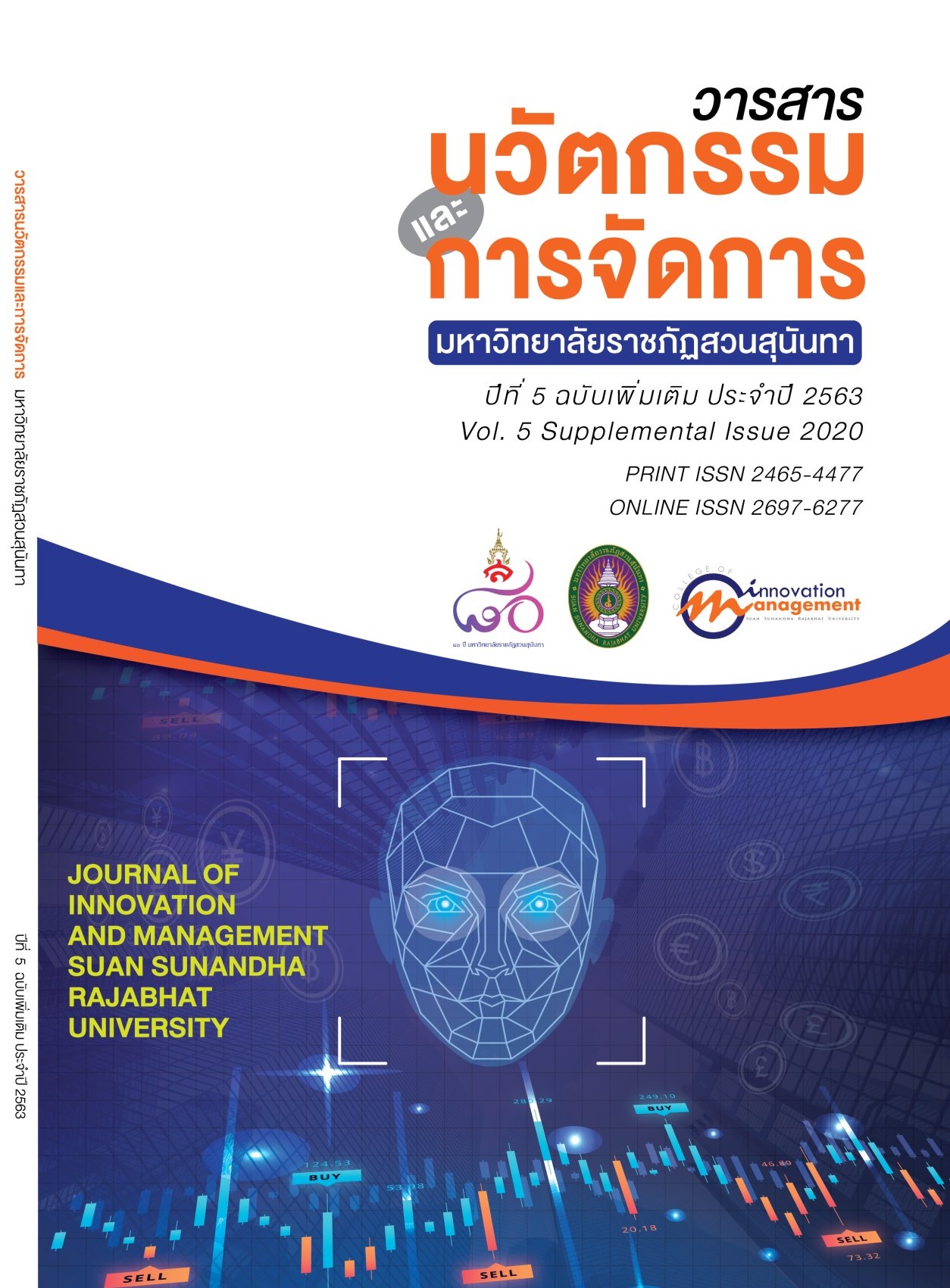Factors Affecting the Self Health Care Behavior of the Elderly “Kharuratana Senior Instructors Club Rajabhat Phranakhon University” Bang Khen District, Bangkok
Keywords:
Self-care behavior, Elderly, Biological factor, Psychological factor, Social factorAbstract
The objective of this research were (1) to study self-care behavior (2) to study the psychological factor and social factor of the elderly that affect self-care behavior and (3) to compare self-care behaviors in the elderly of the Kharuratana Senior Instructors Club Rajabhat Phranakhon University, Bangkhen district in Bangkok with different gender, age, marital status, education level, income and family characteristics. Research instruments were open-ended and closed-ended questionnaires. The population used in this study was the elderly, both males and females aged 60 years and over and being members in the Kharuratana Senior Instructors Club Rajabhat Phranakhon University, Bangkhen district in Bangkok, 325 people, of which 180 samples were selected from Krejcie and Morgan approach by using a simple random sampling method. The results of this study revealed that majority of respondents were 112 females, it calculated to 62.2 percentage. Respondents age between 70-74 years old about 121 people, it can calculate to 67.2 percentage. There were 109 married respondents, it calculated to 60.6 percentage and 168 people with higher education than bachelor's degree or 93.3 percentage. Respondents have an average monthly income 25,000-50,000 baht, 82 people, representing 45.6 percentage and there were 112 people who being extended family members with 62.2%. The study found that (1) self-care behavior in the elderly of the Kharuratana Senior Instructors Club Rajabhat Phranakhon University, Bangkhen district in Bangkok is at a high level, (2) Elderly of the Kharuratana Senior Instructors Club Rajabhat Phranakhon University, Bangkhen district in Bangkok with different gender, age, marital status, education level, income and family characteristics have no difference in self-care behavior at the level of significant 0.05, and (3) Psychological and social factors affecting self-care behavior of the Kharuratana Senior Instructors Club Rajabhat Phranakhon University, Bangkhen district in Bangkok
References
Bandura, A. (1986). Social Foundations of Thought and Action : A Social Cognitive Theory. Englewood Cliffs. New Jersey: Prentice-Hall.
Cobb, S. (1976). Social Support as a Moderated of Life Stress, Psychosomatic Medicine, 38(1), 3.
Foundation of Thai Gerontology Research and Development Institute. (2013). Annual report Situation of the Thai Elderly 2010. Nontaburi: SS Plus Media. (in Thai)
Gadudom, P. et al. (2011). Effects of an Elderly Health Promotion Program in Bangkaja Sub-District Municipality, Amphur Muang, Chanthaburi. Chanthaburi: Phrapokklao Nursing College. (in Thai)
Krejcie, R. V. and Morgan, D. W. (1970). Determining Sample Size for Research Activities. Educational and Psychological Measurement, 30(3), 607-610.
Koedphaen, C. (2008). Health-Promoting Behaviors of the Elderly in Makham Sung Sub-district, Mueang District, Phitsanulok Province. [Online]. Retrieved May 20, 2020, from http://www.hpc9.anamai moph.go.th/research/ (in Thai)
Luangsuwimon, M. and Panriansaen, R. (2017). Health Promotion Activities and Satisfaction with Services of the Member of Longevity Club of Thailand. Journal of Innovation and Management Suan Sunandha Rajabhat University, 2(2), 20-35. (in Thai)
Lyovarin, U. (1991). The Importance of education affecting the mental, characteristic and health behavior of workers in Bangkok. Thesis of the Degree of Master of Science Program in Applied Behavioral Science Research. Bangkok: Srinakharinwirot University. (in Thai)
Nakwijit, B. (2008). Psycho-Social Factors Related To Self-Care Behavior And Happiness of The Senior Citizen Club Members In The Hospitals Under Medical Service Department, Bangkok Metropolis. Thesis of the Degree of Master of Science Program in Applied Behavioral Science Research. Bangkok: Srinakharinwirot University. (in Thai)
National Statistical Office. (2012). Important statistics on the elderly (From the situation of the Thai elderly: 2012). Bangkok: National Statistical Office. (in Thai)
Rattana, W. (2009). Health Care Behavior and Social Support with Elderly's of Life Quality of Aging Club at Suratthani Central Hospital. Thesis of the Degree of Master of Education Program in Development Psychology. Bangkok: Srinakharinwirot University. (in Thai)
Sawangsri, B. and Tangngam, S. (2012) Self - health care of the elderly in Samchuk District, Suphanburi Province. RMUTSB Academic Journal, 1(2), 128-137. (in Thai)
Siripanich, B. (2000). Health problems of the Thai elderly. 3rd Ed. Bangkok: Thai Gerontology Research and Development Institute. (in Thai)
The Secretariat of The House of Representatives. (2018). Aging society and driving the Thai economy. Bangkok: The Secretariat of The House of Representatives. (in Thai)
Thienthong, T. (2003). Psychosocial factors related to health-promoting behavior in Thai high school adolescents within educational region 1. Thesis of the Degree of Master of Science Program in Applied Behavioral Science Research. Bangkok: Srinakharinwirot University. (in Thai)
Tungsurat, P. and Ponghirun, V. (2010). The Health Care Behavior of the Elderly in Bangmuang Sub District Municipality, Muang District, Samutprakan Province. Science Journal Chandrakasem Rajabhat University, 20(1), 57-69. (in Thai)
Downloads
Published
How to Cite
Issue
Section
License
Copyright (c) 2020 Journal of Innovation and Management

This work is licensed under a Creative Commons Attribution-NonCommercial-NoDerivatives 4.0 International License.
See Publication Ethics https://so03.tci-thaijo.org/index.php/journalcim/Ethics






